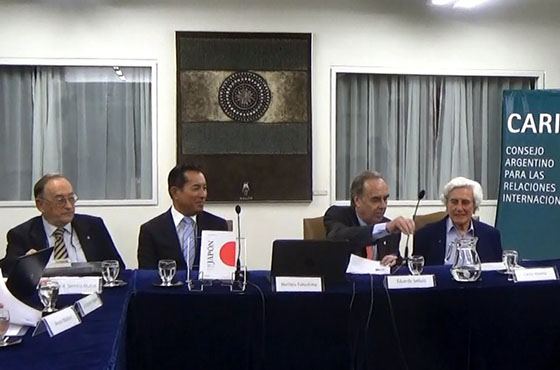

September 6, 2018
Academic session conducted by Luis Argüero, Arturo Marfort, Cecilia Onaha and José Ramón Sanchís Muñoz, organized by the Asian Affairs Committee
Written by Carla Gebetszberger and Matthias Garcia de Cruz
This academic session encompassed the presentation of "Japón en el siglo XXI: visiones desde el Sur", published by CARI and the Universidad Nacional de Tres de Febrero.
CARI’s Asian Affairs Committee director, Eduardo Sadous, opened the session presenting Japan’s current situation and its relations with Argentina.
Japan has had a lot of difficulties but we are fighting every day to overcome themNoriteru Fukushima
Afterwards, Carlos Moneta stated that Argentina is one of the few countries in South America does analyze Japan’s orientations. This is why the book shows a "complete and global vision about Japan". It analyzes the different cultural aspects, its economic development and its relation with South America, among other things.
But more importantly, Japan represents a "concrete example of a rising phoenix" because it managed, thanks to "huge efforts, innovation and long term politics", to overcome the postwar destruction. "Japan has an unusual capacity to overcome challenges such as the 2011 tsunami and nuclear disaster", claimed Moneta. Japan would be well prepared for tomorrow challenges.
Today´s Japan has the lowest unemployment rate it has ever had in the last centuryLuis Argüero
Subsequently, the ambassador of Japan, Noriteru Fukushima, presented two important aspects to understand Japan: in first place, he highlighted that Japan was indeed historically able to adapt to all situations and to have long term plans. Japan and Argentina are strengthening their economic, political and cultural links.
The book, therefore, allows us to understand deeply the Japanese situation and help creating new bilateral relations. Secondly, he claimed "the multidimensionality of Japan´s analysis made by the book helps to see the capacity of Japan to adapt and to always seek progress".
It is not just about friendship but about creating cultural linksCecilia Onaha
Later, Luis Argüero, the book’s publisher, talked about the "Abenomics", an economic plan that has three mains axis: monetary expansion, fiscal incentives and structural reforms. "The study of the Japan’s objective to get out of deflation by using a bigger monetary basis is interesting", the speaker said.
Moreover, the Abenomics’s effects are already being seen in Japan: the GDP is growing at a "relatively good" rate, taxes have diminished and the VAT has increased. The Japanese plan has its focus around companies aiming to increase their activity. However, some matters do have to be changed. For instance, the GDP should be mostly explained by the internal consumption, pointed Argüero.
Arturo Marfort, a retired naval attaché, asked about if it was the region that weighted on the Japanese defense politic or if it was the Japanese defense politic that weighted on the Asian region. For him "both ideas are two sides of the same coin" because they influence on each other. The Japanese position, he stated, can be analyzed with three documents: the objectives of National defense, the defense program at mid-term, and the white book.
He claimed that China was Japan’s main enemy but that armed conflict was more distant than before. In conclusion, he defended the idea that "there is no substantial impact on the region from Japan´s defense politics" and that the country will continue "the use of its self-defense forces to a fully pacific aim".
Cecilia Onaha was the next speaker taking the floor and she made a presentation about the cultural relations between Argentina and Japan. Current technology communications have created more opportunities to learn in real time from new information, however we may rely on typical tourist views.
Why should we recommend this book? Onaha answer that it will perfectly suit everyone that wants to start new relations with Japan or either learn from its culture. For the speaker all the chapters of the book contain a cultural facet.
Japan is a democratic country in a continent where democratic states are far from being perfect. Perhaps the more democratic state in AsiaJosé Ramón Sanchís Muñoz
To conclude, Sanchís Muñoz made a few comments on his book contribution: the last 120 years chronology on Argentina and Japan’s relationship. He therefore presented some meaningful events: In the first place, he talked about Sarmiento’s visit to Japan in 1899. It was the start of a true friendship between the Argentine and the Japanese marine.
He continued talking about the Japanese emigration to Argentina, which represents today one of the most respected communities in our country, and brought the country a big learning in terms of science and culture. Lastly, he made a reference to the Argentinian nun, Madre Ramallo, whose dedication for developing the education in Japan contributed to a stronger link between the two countries.
He finally concluded by saying that both countries have had an incredible cultural impact on each other’s culture, and that we should celebrate that.
Carlos MonetaForeign Affairs graduate at the University of Pennsylvania, USA
Noriteru FukushimaJapanese Ambassador in Argentina
Eduardo SadousAmbassador. Director of the CARI's Asiatic affairs committee
Luis ArgüeroPhD in Economics at the University of Hiroshima, Japan
Arturo MarfortFormer Naval attaché of the Argentinian Embassy in Tokyo
Cecilia OnahaPhD in Cultural Studies, School of Cultural and Social Studies, Kyoto
José Ramón Sanchís MuñozAmbassador. PhD in Diplomacy at the American University, Washington DC, USA


























